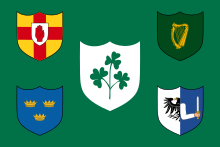Jack Gore
John Henry "Jack" Gore (16 June 1899 – 18 March 1971) was a Welsh international rugby flanker who played rugby union for Blaina and rugby league for Salford.[3][4][2] His son, Billy Gore, played international rugby for Wales national rugby union team the same as his father.
- For other persons named John Gore, see John Gore
- For the actor, see Jack Gore (actor)
| Birth name | John Henry Gore[1] | ||||||||||||||||||||||||||||||||
|---|---|---|---|---|---|---|---|---|---|---|---|---|---|---|---|---|---|---|---|---|---|---|---|---|---|---|---|---|---|---|---|---|---|
| Date of birth | 16 June 1899 | ||||||||||||||||||||||||||||||||
| Place of birth | Blaina, Monmouthshire, Wales | ||||||||||||||||||||||||||||||||
| Date of death | 18 March 1971 (aged 71) | ||||||||||||||||||||||||||||||||
| Place of death | Nantyglo, Monmouthshire, Wales | ||||||||||||||||||||||||||||||||
| Notable relative(s) | Billy Gore son | ||||||||||||||||||||||||||||||||
| Spouse | Ceinwen | ||||||||||||||||||||||||||||||||
| Children | Jack, William, Mary, Ceinwen, Colin | ||||||||||||||||||||||||||||||||
| Occupation(s) | collier/publican | ||||||||||||||||||||||||||||||||
| Rugby league career | |||||||||||||||||||||||||||||||||
| |||||||||||||||||||||||||||||||||
| Rugby union career | |||||||||||||||||||||||||||||||||
| |||||||||||||||||||||||||||||||||
Rugby career
Gore played all his rugby union for the unfashionable lower level club Blaina, though during this period the Welsh selectors would often choose tough manual workers to represent the forward positions. Gore first represented Wales in the 1924 Five Nations Championship in a match at the Cardiff Arms Park against Ireland. Under the captaincy of Jack Wetter, Gore found himself on the losing team which stopped a run of 9 successive home wins for Wales. His second game was against France and although a win for Wales, it was a poor Welsh performance caused by players being thrown out of position by the selectors decision to suspend Ossie Male on the trip to Paris. Gore was selected later in the year to face the touring New Zealand team. Wales were totally outclassed by the All Blacks, though the forwards put on a spirited display.[5]
The next year Gore played his final game for Wales, when he faced England during the 1925 Championship. Wales lost the game 12–6, and Gore played no further international union games. He switched codes to the professional league game when he joined Salford later in 1925.[6]
Whilst captain of Salford he played for both the England and Wales positioned at loose forward, i.e. number 13, during the era of contested scrums. Many say that he played for the Great Britain rugby league team as he was of Welsh birth and was not the only Welshman to play for this team, however local Salford newspaper reports of the day clearly record: To Jack Gore our Captain, we offer our very hearty congratulations on his selection as Loose Forward for 'England' on the occasion of the Third and Final Test against the All Blacks to be played at Leeds, on 15 January 1927. This match of course depends upon what transpires at the League Councils Meeting, held on Wednesday last. This honour, by the way is not unexpected, when having read Old Stagers report of the recent Wales v. All Blacks, an extract from the South Wales News which is as follows: GORE, a forward who would be an acquisition to any pack of Forwards - on his showing at Pontypridd. Gore is one of the greatest Forwards Wales has ever produced - would secure a 'place' in any National side for which he was qualified
Gore qualified to play for England because of his father's nationality.
Jack made his début for Salford against St Helens on 28 February 1925 as a Second-row before quickly being switched to loose forward with great effect. Gore made 125 appearances for Salford between 1925 and 1928 scoring 29 tries. He played his last game for Salford at Barrow on 9 April 1928. He transferred to Wigan Highfield during the close season. Gore then played for Wigan Highfield from 1928 until 1932 making 109 appearances and scoring 17 tries.
Jack Gore played loose forward in Monmouthshire's 14-18 defeat by Glamorgan in the non-County Championship match during the 1926–27 season at Taff Vale Park, Pontypridd on Saturday 30 April 1927.[7]
Gore returned to his birth town where he ran the Kings Head public house, High Street, Blaina. Gore was often suspected of being a rugby league spy for Salford. It is reported that he was instrumental in spotting the great Dai Watkins, also from Blaina who followed Gore to Salford after his days as a Welsh International rugby star.
International rugby union matches played
Wales[8]




Gore was also a Reserve on 2 February 1924. Played at Inverieth, Edinburgh, SCOTLAND 35 WALES 10
International rugby league matches played
Wales


England[2]

Bibliography
- Billot, John (1972). All Blacks in Wales. Ferndale: Ron Jones Publications.
- Godwin, Terry (1984). The International Rugby Championship 1883-1983. London: Willows Books. ISBN 0-00-218060-X.
- Smith, David; Williams, Gareth (1980). Fields of Praise: The Official History of The Welsh Rugby Union. Cardiff: University of Wales Press. ISBN 0-7083-0766-3.
References
- Newport Gwent Dragons player profiles Archived 17 June 2011 at the Wayback Machine
- "Statistics at rugbyleagueproject.org (RL)". rugbyleagueproject.org. 31 December 2017. Retrieved 1 January 2018.
- "Statistics at en.espn.co.uk (RU)". espn.co.uk. 31 December 2017. Retrieved 1 January 2018.
- "Statistics at wru.co.uk (RU)". wru.co.uk. 31 December 2017. Archived from the original on 28 March 2018. Retrieved 1 January 2018.
- Billot (1972), pg 68.
- Bale, John; The Global Sports Arena: Athletic talent migration in the interdependent world. Routledge pg28 ISBN 978-0-7146-4116-4
- Irvin Saxton (publish date tbc) "History of Rugby League – № 32 – 1926–27". Rugby Leaguer ISBN n/a
- Smith (1980), pg 466.